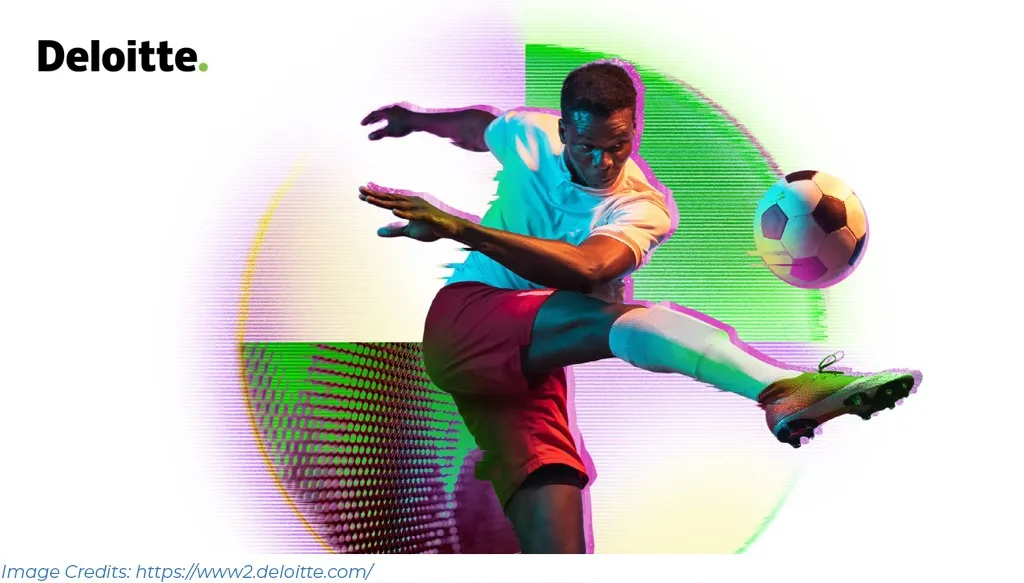Media rights
Sustainability
Mega-events
Team valuations
College athletics
Data privacy
Sponsorship
Digitalization
2024 Sports Industry Outlook: Key Trends Shaping the Future

Media rights
Sustainability
Mega-events
Team valuations
College athletics
Data privacy
Sponsorship
Digitalization
The global sports industry has undergone significant changes in recent years, driven by technological advancements, evolving fan expectations, and shifting business models. Deloitte’s 2024 Sports Industry Outlook identifies five major trends that are set to shape the future of sports, highlighting the industry's adaptability and the opportunities that lie ahead.
Evolving Commercial Models
The sports industry's revenue streams, traditionally dominated by sponsorships, ticket sales, and media rights, are undergoing a transformation. With fan engagement evolving in a more digitalized world, the industry is focusing on diversifying income sources. Emerging opportunities include partnerships with new investors and media rights holders, the growth of women’s sports, and the development of real estate around sports venues to enhance fan experiences.
Team valuations continue to rise, reflecting the industry's economic strength. Notable sales in the NFL, NHL, and NBA set new financial records, and in 2023, the Golden State Warriors paid $50 million for a new Women’s National Basketball Association (WNBA) team. As the NBA prepares for media rights negotiations in 2024, significant increases in the value of those rights are expected, highlighting the competitive media landscape.
However, the sports industry is facing challenges due to shifting consumer behavior, particularly the transition from traditional broadcast and cable TV to streaming. Media companies are seeking ways to make these expensive rights deals profitable, with potential new models such as direct-to-consumer services expected to emerge.
The Rise of Generative AI in Sports
Artificial intelligence (AI) has already revolutionized many aspects of the sports industry, and in 2024, generative AI is set to play an even more significant role. AI applications have enhanced performance analytics, personalized fan experiences, and streamlined operations, but generative AI takes these advancements further. It allows for the creation of new content, such as real-time translations of broadcasts or automated commentary.
Major sports organizations, including LaLiga and Wimbledon, have already adopted generative AI for real-time audio commentary and multilingual translations. The NBA has integrated AI into its app, providing fans with personalized highlights of their favorite players and teams. This technology is also transforming behind-the-scenes operations, optimizing sales, marketing, and event management.
Generative AI is expected to continue its rapid adoption in 2024, with innovative applications emerging across content creation, fan engagement, sports betting, and team performance analysis. However, sports organizations need to carefully balance short-term efficiency gains with the long-term potential for transformation, while also managing risks related to intellectual property and data privacy.
Mega-Events: A New Model for Sustainability and Legacy
Mega-events like the Olympic Games and the FIFA World Cup are facing increasing scrutiny over their sustainability and cost. The 2024 Paris Olympic Games are being positioned as a model for future events, emphasizing sustainability by utilizing preexisting or temporary venues to reduce costs and carbon footprints. This marks a shift from previous mega-events, such as the 2022 FIFA World Cup in Qatar, which incurred enormous expenses.
As technology continues to play a larger role in sports, future mega-events will also focus on enhancing fan experiences through digitalization. The Paris Games, for instance, will leverage "digital twins" of venues and integrate real-time athlete performance data to create immersive experiences for fans both in-person and at home.
Mega-event organizers will need to prioritize sustainability, legacy, and technology to make these events more viable and engaging in the future. This approach not only minimizes environmental impact but also ensures long-term benefits for host cities, such as improved infrastructure and community development.
Fan Data: The Next Frontier for Engagement
As sports organizations strive to deepen their connection with fans, investments in fan data are becoming increasingly crucial. While many organizations have access to fragmented data, the focus in 2024 will be on creating comprehensive fan databases that integrate multiple data points—from ticket purchases to social media interactions.
Aggregating fan data allows sports organizations to personalize their outreach and deliver more targeted marketing, enhancing fan loyalty and engagement. The NFL, for example, has centralized its fan data to streamline communication with over 20 million fans. This data can also be monetized by securing stronger sponsorships and media rights deals, as brands and advertisers look for more precise ways to reach their target audience.
However, building and managing proprietary fan databases requires significant investment in technology, data governance, and privacy compliance. Sports organizations that successfully implement these strategies are likely to see increased fan engagement and new revenue streams.
College Athletics: A ‘New Normal’?
The final trend highlighted in the report addresses the ongoing transformation of college athletics in the U.S. Conference realignment, driven by financial considerations and media rights deals, is creating new challenges for student-athletes, including longer travel times and increased pressure to balance academics with athletics. The evolving landscape of Name, Image, and Likeness (NIL) deals is also raising questions about the future of college sports, with potential new regulations on the horizon.
In 2024, the industry may see efforts to strike a balance between the financial interests of college sports programs and the well-being of student-athletes. As the NCAA and lawmakers consider new policies, institutions will need to adapt to a changing environment that could reshape the relationship between college sports and professional leagues.
The Future of Sports
The 2024 Sports Industry Outlook offers a glimpse into the key trends that will shape the future of sports. From the rise of generative AI and the evolution of fan data to the reimagining of mega-events and the transformation of college athletics, sports organizations must remain agile and forward-thinking to navigate these changes and seize new opportunities.



